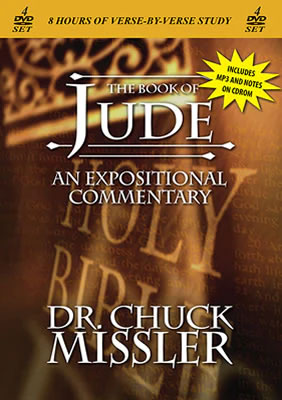This smallest book of the New Testament is also, in many ways, the most provocative.
The Roots Go Deep
The Epistle of Jude is a tiny book, tragically neglected by students, yet overflowing with fascinating Old Testament references and allusions: lessons from Israel in the Wilderness,1 the angels that sinned,2 the strange events in Sodom and Gomorrah,3 Michael and Satan's contention over the body of Moses,4 and other insights from Cain, Balaam, Korah,5 as well as the mysterious person known as Enoch.6
It is surprising to learn of allusions to events in the Old Testament that are only found in the New Testament: the Second Coming prophecy of Enoch,7 that Noah was a preacher of righteousness,8 the names of the two magicians in Egypt,9 that Elijah prayed to stop rain for 3 1/2 years,10 and that the Pharaoh of the Exodus was not Egyptian.11
One of the more mysterious allusions in Jude is about the dispute between Michael and Satan over the body of Moses. Why were they both interested in Moses' body? (There are over 500 Old Testament references to Moses: only one refers to his body.12) Is there a relationship between the mountain containing Moses' sepulcher and Elijah's departure?
The Real Reason
Why study the book of Jude? Because it is written for us today. It is written for the end times, for the end of the Church Age. The beginning of the Church Age was, of course, the Acts of the Apostles. However, the end of the Church Age might be called the Acts of the Apostates. Jude is the only book devoted entirely to the great apostasy.13 "Shall the Son of Man find faith on the Earth?"14
Jude is the "vestibule" to the book of Revelation. It includes the oldest prophecy uttered by a prophet: of the Second Coming of Christ, declared before the flood of Noah! There are four facts emphasized:
- We know the Lord's coming is sure;
- We know who will accompany the Lord;
- We know the purpose of His coming;
- We know the result of the Lord's coming.
This letter was written by the "brother of James," one of four brothers of Jesus.15 (James was the head of the church in Jerusalem; neither James nor Jude were among The Twelve; they didn't believe at first.16)
Why did Jude write this letter? James' epistle deals with good works as evidence of saving faith; Jude's letter deals with evil works as evidence of apostasy. Why must we contend for the faith? Because there are tares among the wheat,17 false brethren have stolen into the church,18 and the saints are in peril, 19 all due to the "doctrines of demons." 20 This letter was written for the church in the end times. This letter was written for us today.
Personal Benefit
It was an 11-day journey from Horeb to Kadesh-Barnea, 21 yet it took Israel 38 years! Over a million left Egypt, but only two Israelites (over 20) who left Egypt ever reached Canaan! Why? (Despite the common reckoning, Canaan is not representative of heaven; the Jordan is not representative of death. We are to leave behind the wilderness of doubt, defeat, and failures, and enter victory!)
We live in uniquely challenging times and this little book is truly essential for the unique challenges facing us today. (While we usually explore our Expositional Commentaries on a chapter-per-session basis, we have devoted eight sessions to this little one-chapter book!)
If you like surprises, this tiny book will prove a unique pleasure (as well as an essential equipping!). Enjoy!
Notes:
- Numbers 14, 1 Corinthians 10, Hebrews 3 and 4.
- Isaiah 14, Ezekiel 28, Genesis 6.
- Genesis 18 & 19.
- Deuteronomy 34, Revelation 11-12.
- Genesis 4, Numbers 16, 22-25, 31.
- Genesis 5.
- Jude 14, 15.
- 2 Peter 2:5.
- 2 Timothy 3:8.
- James 5:17. (1 Kings 17:1 & 18:1 do not link long drought in Ahab's reign to the prayers of the prophet.)
- Acts 7:18: "another" in the Greek is heteros, not allos; i.e., "another" of a different kind. Cf. Isaiah 52:4.
- Deuteronomy 34:5,6.
- Apostosia, "falling away," 2 Thess 2:3; Departure from the faith, 1 Timothy 4:1; unwillingness to endure sound doctrine, 2 Timothy 4:3; False teachers and damnable heresies, 2 Peter 2:1; 3:3.
- Luke 18:8.
- Mark 6:3; (cf. Psalm 69:7,8).
- Cf. John 7:5.
- Matthew 1:24-30.
- Galatians 2:4-5.
- 2 Corinthians 11:26.
- 1 Timothy 4:1,6.
- Deuteronomy 1:2.







